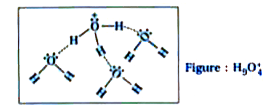Explain : Proton (H+) does not exist in aqueous solution.
Text Solution
Hydrogen ion (H+) by itself is a bare (i) proton with very small size (~10−15m radius) (ii) proton intense electric field.
So, proton binds itself with the water molecule at one of the two available lone pairs on it by coordinate bond and giving H2O+.

This hydronium ion is H3O+ species and contain trigonal pyramidal geometry. This H3O+ species has been detected in many compounds like H3O+Cl− in solid state.
Similarly the hydroxyl ion is hydrated to give several ionic species like H5O+2,H7O+3,H9O+4 etc.
H2OH+−−→H3O+(aq)+H2O−−−→H5O+2+H2O−−−→H7O+3(aq)+H2O−−−→H9O+4(aq)

So, proton does not exist independent in aqueous solution, but it exist as hydronium ion or oxonium ion.
|
Topper's Solved these Questions
- EQUILIBRIUMBOOK - KUMAR PRAKASHANCHAPTER - EQUILIBRIUMEXERCISE - SECTION-A Try Your self -2
6 Videos
- EQUILIBRIUMBOOK - KUMAR PRAKASHANCHAPTER - EQUILIBRIUMEXERCISE - SECTION-A Try Your self -3
10 Videos
- ENVIRONMENT CHEMISTRY BOOK - KUMAR PRAKASHANCHAPTER - ENVIRONMENT CHEMISTRY EXERCISE - Question For Module (Section-C)
1 Videos
- HYDROCARBONSBOOK - KUMAR PRAKASHANCHAPTER - HYDROCARBONSEXERCISE - (Questions for Module (Section - D))
1 Videos
Similar Questions
Knowledge Check
Which of the following pair of compounds cannot co-exist in aqueous solution?
ANa2CO3,K2CO3BNaHCO3,NaOHCRb2CO3,KHCO3DNaOH and KCIB3+ cannot exist in aqueous solution because of its :
AStrong reducing abilityBStrong oxidizing abilityCSmall size and large chargeDLarge size and small chargeWhich of following ions do not exist togther in aqueous solution:
APb2+,F−BTI3+,I−CBoth (A) and (B)DNone of these
Explain why Cu+ ion is not stable in aqueous solution ?
View SolutionExplain why Cu+ ion is not stable in aqueous solution.
View SolutionB3+ cannot exist in aqueous solution because of its :
View SolutionWhich of following ions do not exist together in aqueous solution:
View SolutionExplain why Cu+ ion is not stable in aqueous solution ?
View Solution
